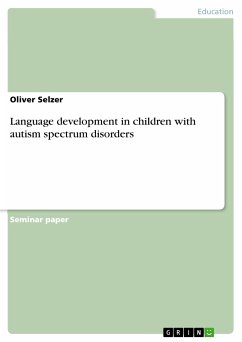Seminar paper from the year 2012 in the subject Pedagogy - Pedagogic Psychology, grade: 2,0, University of Cologne, language: English, abstract: The development or acquisition of language separates the human being from any other mammal, enabling him to efficiently communicate and socialize with every other member of the same race. Thus, acquiring and developing this form of communication is crucial not only for means of transporting meaning itself, but for ensuring the human race to exist. Under normal circumstances every child can acquire every existing language, depending on it’s surrounding (cf. chapter two). Normal circumstances imply medical, cognitive and social parameters; if these three determining factors play together typically, a child may acquire a language in a stage-like order. In each stage, fundamental elements (or rules) of language are being learned (e.g. phonology, morphology, prosody etc.). In case of an autism spectrum disorder, one or more of the three determining factors is deficient – hence the acquisition of language deviates from its typical course. As will be described in chapter one, the actual type of autism plays a pivotal role in how problems in language acquisition will manifest: e.g., children with Asperger syndrome or some other type of high-functioning autism will be more likely to have problems in Pragmatics, whereas children with low-functioning type of autism may be challenged with producing language at all. Hence in this paper, I will examine this deviant development by looking closely into the fundamental rules of language in “typical” and autistic learners. I will introduce very basic knowledge on medical, cognitive and social impairments autism spectrum disorders may consist of; then, the above mentioned comparison of fields of language will be conducted. Chapter four will conclude with prospects on therapeutics and teaching, introducing concepts and constructing possible classroom intervention.

